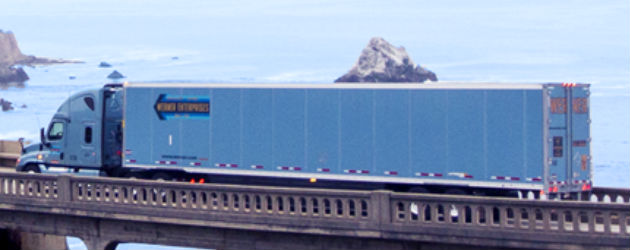Werner Enterprises Reports First Quarter 2013 Revenues and Earnings
 Werner Enterprises, Inc. (NASDAQ: WERN), one of the nation’s largest transportation and logistics companies, reported revenues and earnings for the first quarter ended March 31, 2013.
Werner Enterprises, Inc. (NASDAQ: WERN), one of the nation’s largest transportation and logistics companies, reported revenues and earnings for the first quarter ended March 31, 2013.
Werner Enterprises had an 18% decrease in earnings per diluted share in first quarter 2013 compared to first quarter 2012. Year-over-year earnings improvement in first quarter 2012 compared to first quarter 2011 was 30%, and in first quarter 2011 compared to first quarter 2010 was 49%.
First quarter 2013 freight demand (as measured by our daily morning ratio of loads to trucks in our One-Way Truckload network) followed typical seasonal patterns and was similar to first quarter 2012. As we noted a year ago in our first quarter 2012 earnings release, unusually mild winter weather in first quarter 2012 had a modest positive impact on that quarter’s operational efficiency and certain operating costs. We experienced more severe winter weather in first quarter 2013, which had a modest negative impact on truck productivity and caused operating expenses in the current quarter to be somewhat higher. We also had startup costs for new business added during first quarter 2013 in our Logistics, Dedicated and One-Way Truckload business units. To date in April 2013, we are experiencing softer freight demand trends compared to the same period in April 2012.
Average revenues per total mile, net of fuel surcharge, rose 1.3% in first quarter 2013 compared to first quarter 2012. There was a minimal amount of base freight rate increases in first quarter 2013, as many customer bids were in process during first quarter 2013. We currently expect bid activity to remain high, as it normally does, into second quarter 2013. Spot market rates were lower year-over-year in January and February 2013 and strengthened to slightly positive on a year-over-year basis in March 2013. We believe there are several truckload capacity constraints including an older industry truck fleet, the higher cost of new trucks and trailers, significant safety regulatory changes and a challenging driver market. We continue to work jointly with our customers to secure sustainable transportation solutions across all modes and to offset increased rates through enhanced optimization and transportation solutions whenever possible.
According to the company, “Average monthly miles per truck declined by 3.2% in first quarter 2013 compared to first quarter 2012. We attribute this decrease to (i) more severe winter weather in 2013, (ii) one less business day in first quarter 2013 (due to leap year in first quarter 2012) and (iii) the Easter holiday falling on the last day of first quarter 2013 compared to the second week of April in 2012.
“We continue to diversify our business model with the goal of achieving a balanced portfolio of revenues comprised of One-Way Truckload (which includes the short-haul Regional, medium-to-long-haul Van and Expedited fleets), Specialized Services and VAS. In first quarter 2013, we averaged 7,157 trucks in service and we ended the quarter with 7,090 trucks (a decrease of 60 from the end of fourth quarter 2012). Our Specialized Services unit, primarily Dedicated, ended the quarter with 3,495 trucks (or 49% of our total fleet). During first quarter 2013, we shifted 200 trucks from One-Way Truckload to Dedicated due to new business awards.
“Diesel fuel prices were 4 cents per gallon lower in first quarter 2013 than in first quarter 2012 and were 4 cents per gallon lower than in fourth quarter 2012. For the first 18 days of April 2013, the average diesel fuel price per gallon was 24 cents lower than the average diesel fuel price per gallon in the same period of 2012 and 2 cents higher than in second quarter 2012. The components of the Company’s total fuel cost consist of and are recorded in our income statement as follows: (i) Fuel (fuel expense for company trucks excluding federal and state fuel taxes); (ii) Taxes and Licenses (federal and state fuel taxes); and (iii) Rent and Purchased Transportation (fuel component of our independent contractor costs, including the base cost of fuel and additional fuel surcharge reimbursement for costs exceeding the fuel base).
 “Capacity in our industry remains constrained by economic and safety regulatory factors. Following the 2008 recession, class 8 truck builds have been low, resulting in an industry average truck age that remains historically high at 6.6 years. It is very difficult for many smaller and medium size private carriers to replace their older, lower-value trucks with much higher cost, EPA-compliant new trucks, which significantly reduces the risk of trucks being added to the market. We reduced the average age of our much younger truck fleet by half a year during 2011 and 2012, with net capital expenditures totaling $457 million during that two-year period. The significantly higher cost of new trucks and resulting higher depreciation expense and related diesel exhaust fluid costs is not being recovered through a single year customer rate review cycle. We continue to invest in equipment solutions such as more aerodynamic truck features, idle reduction systems, tire inflation systems and trailer skirts to improve the mile per gallon efficiency of our fleet. Net capital expenditures of $21.3 million in first quarter 2013 were low as planned, and the majority of our 2013 capital expenditures are expected to occur in the last three calendar quarters of the year. We expect our net capital expenditures for the full year 2013 to be in a range of $100 million to $150 million. The average age our truck fleet as of March 31, 2013 was 2.4 years, and our goal is to maintain our average truck age at approximately this level during 2013. We remain committed to investing in a best in class fleet for the benefit of our customers, our drivers and the Werner brand.”
“Capacity in our industry remains constrained by economic and safety regulatory factors. Following the 2008 recession, class 8 truck builds have been low, resulting in an industry average truck age that remains historically high at 6.6 years. It is very difficult for many smaller and medium size private carriers to replace their older, lower-value trucks with much higher cost, EPA-compliant new trucks, which significantly reduces the risk of trucks being added to the market. We reduced the average age of our much younger truck fleet by half a year during 2011 and 2012, with net capital expenditures totaling $457 million during that two-year period. The significantly higher cost of new trucks and resulting higher depreciation expense and related diesel exhaust fluid costs is not being recovered through a single year customer rate review cycle. We continue to invest in equipment solutions such as more aerodynamic truck features, idle reduction systems, tire inflation systems and trailer skirts to improve the mile per gallon efficiency of our fleet. Net capital expenditures of $21.3 million in first quarter 2013 were low as planned, and the majority of our 2013 capital expenditures are expected to occur in the last three calendar quarters of the year. We expect our net capital expenditures for the full year 2013 to be in a range of $100 million to $150 million. The average age our truck fleet as of March 31, 2013 was 2.4 years, and our goal is to maintain our average truck age at approximately this level during 2013. We remain committed to investing in a best in class fleet for the benefit of our customers, our drivers and the Werner brand.”
The company also noted: “The driver recruiting and retention market became more challenging during first quarter 2013. Significant factors included a declining number of and increased competition for driver training school graduates, a gradually declining national unemployment rate and a strengthening housing construction market. While we are not immune to fluctuations in the driver market, we continue to believe we are in a better position in the current market than many competitors because approximately 70% of our driving jobs are in more attractive, shorter-haul Regional and Dedicated fleet operations that enable us to return these drivers to their homes on a more frequent and consistent basis.
“Gains on sales of assets were $3.5 million in first quarter 2013 compared to $4.7 million in first quarter 2012 and $4.7 million in fourth quarter 2012. We sold fewer trucks and trailers in first quarter 2013 and had slightly lower average gains per truck and trailer. We expect to sell fewer trucks and trailers in 2013 compared to 2012. Gains on sales are reflected as a reduction of Other Operating Expenses in our income statement.
“To provide shippers with additional sources of managed capacity and network analysis, we continue to develop our non-asset-based VAS segment. VAS includes Brokerage, Freight Management, Intermodal and Werner Global Logistics (International).”
About Werner Enterprises
Werner Enterprises, Inc. was founded in 1956 and is a premier transportation and logistics company, with coverage throughout North America, Asia, Europe, South America, Africa and Australia. Werner maintains its global headquarters in Omaha, Nebraska and maintains offices in the United States, Canada, Mexico, China and Australia. Werner is among the five largest truckload carriers in the United States, with a diversified portfolio of transportation services that includes dedicated van, temperature-controlled and flatbed; medium-to-long-haul, regional and local van; and expedited services. Werner’s Value Added Services portfolio includes freight management, truck brokerage, intermodal, and international services. International services are provided through Werner’s domestic and global subsidiary companies and include ocean, air and ground transportation; freight forwarding; and customs brokerage.
More at Werner Enterprises.
Category: Featured, General Update, Management









